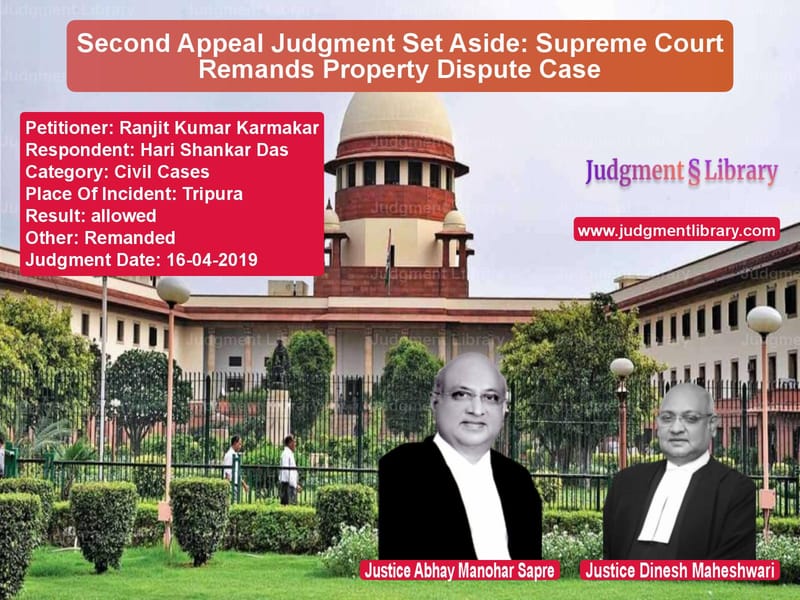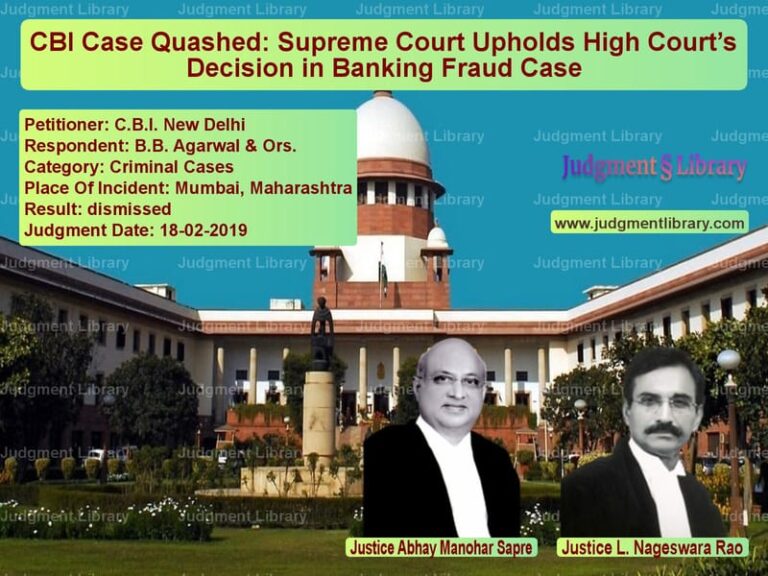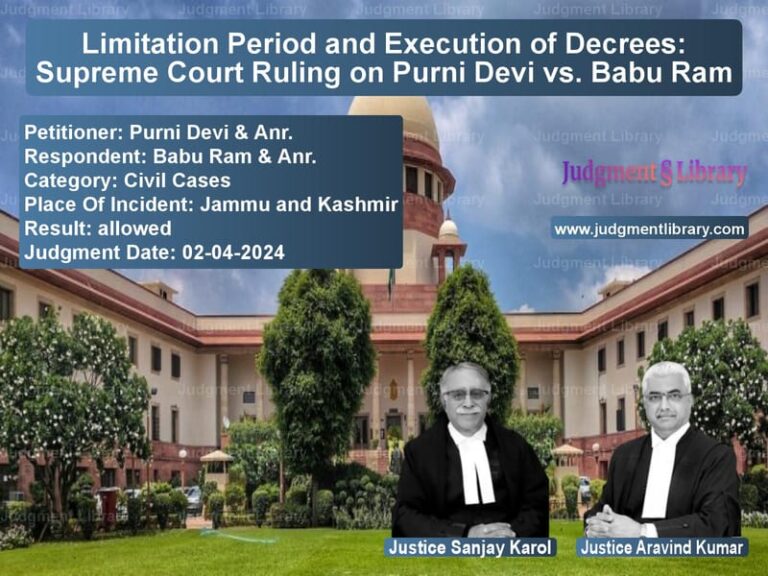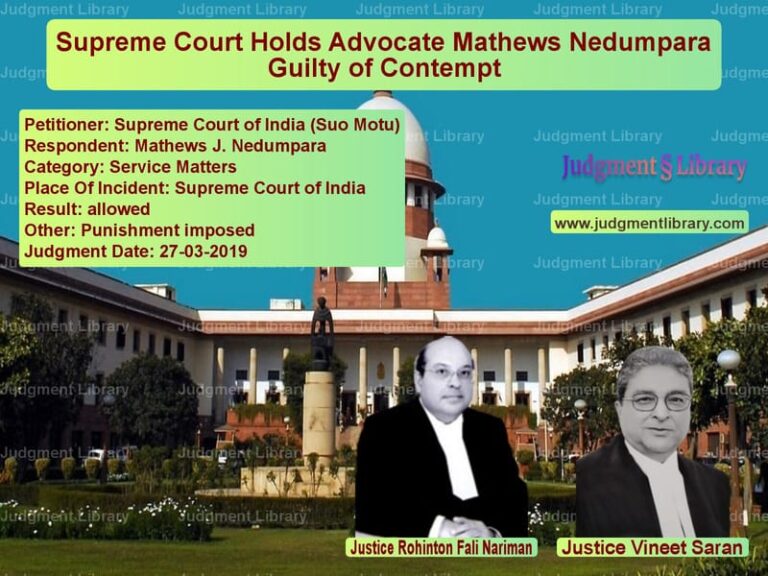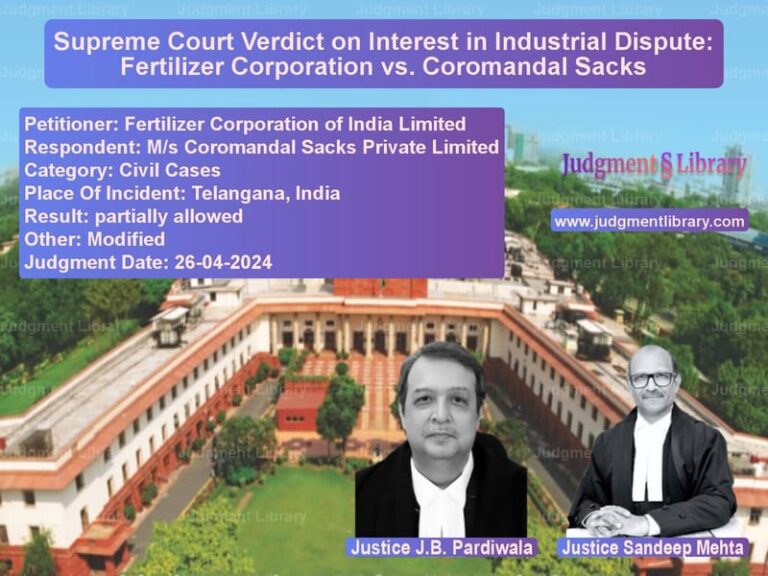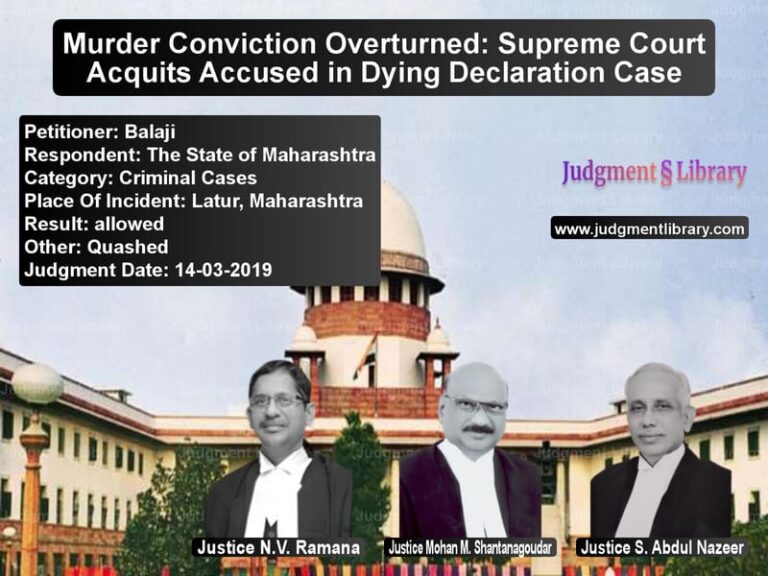Second Appeal Judgment Set Aside: Supreme Court Remands Property Dispute Case
The case of Ranjit Kumar Karmakar vs. Hari Shankar Das revolves around a property dispute that has gone through multiple stages of litigation, including trial court, first appeal, and second appeal. The Supreme Court, in this case, reviewed the manner in which the High Court handled the second appeal and found that it failed to address the substantial questions of law raised. As a result, the Supreme Court set aside the High Court’s order and remanded the case for fresh adjudication.
Background of the Case
The appellant, Ranjit Kumar Karmakar, had filed a civil suit (T.S. No. 103 of 2004) in the Civil Judge (Junior Division) court, seeking:
- A declaration of his right, title, and interest over the disputed land.
- Confirmation of his possession over the suit land.
- A permanent injunction against the respondent.
The suit was contested by the respondent, Hari Shankar Das, and was eventually dismissed by the trial court on 05.04.2006.
Feeling aggrieved, the appellant filed a first appeal (T.A. No. 34/2006) before the Additional District Judge, West Tripura, Agartala. The First Appellate Court, by judgment dated 24.04.2007, allowed the appeal and ruled in favor of the appellant.
The respondent, dissatisfied with this decision, then filed a second appeal before the High Court of Tripura, which overturned the decision of the First Appellate Court and restored the trial court’s judgment. The appellant then approached the Supreme Court.
Arguments by the Petitioner
The appellant, through his legal counsel, raised the following arguments:
- The High Court admitted the second appeal and framed six substantial questions of law but failed to answer them on their merits.
- Instead of addressing the legal questions framed at the time of admission, the High Court decided the appeal as if it was a first appeal, which is not permissible under Section 100 of the Code of Civil Procedure (CPC).
- The High Court’s approach violated the principles governing second appeals and deprived the appellant of a proper legal remedy.
Arguments by the Respondent
The respondent countered the appellant’s arguments by stating:
- The High Court was within its jurisdiction to review the findings of the lower courts and to decide the matter as deemed fit.
- The reversal of the First Appellate Court’s decision was based on a thorough examination of facts and evidence.
- There was no requirement to explicitly answer each framed question if the High Court found that the trial court’s judgment was correct.
Supreme Court’s Observations
The Supreme Court found that the High Court’s handling of the second appeal was procedurally flawed. It observed:
“The High Court, though admitted the second appeal on six questions, did not answer any of them on merits and instead went into discussions on other issues which were not the subject matter of the substantial questions framed.”
The Court further emphasized that under Section 100(5) of the Code of Civil Procedure, once the High Court admits a second appeal by framing substantial questions of law, it must confine its adjudication to those questions alone. The failure to do so rendered the judgment legally unsustainable.
Final Judgment
The Supreme Court ruled in favor of the appellant, setting aside the High Court’s decision and remanding the case for fresh adjudication. The Court held:
“Since the High Court failed to answer the six substantial questions of law framed at the time of admitting the second appeal, its order is not legally sustainable and has to be set aside.”
The case was sent back to the High Court with directions to rehear the second appeal and decide it strictly in accordance with law, without being influenced by its previous observations.
Significance of the Judgment
This case is a crucial precedent in procedural law, particularly concerning the handling of second appeals. The judgment reinforces that High Courts must strictly adhere to the framework laid down under Section 100 CPC and cannot decide second appeals beyond the substantial questions of law framed at admission.
Petitioner Name: Ranjit Kumar Karmakar.Respondent Name: Hari Shankar Das.Judgment By: Justice Abhay Manohar Sapre, Justice Dinesh Maheshwari.Place Of Incident: Tripura.Judgment Date: 16-04-2019.
Don’t miss out on the full details! Download the complete judgment in PDF format below and gain valuable insights instantly!
Download Judgment: Ranjit Kumar Karmaka vs Hari Shankar Das Supreme Court of India Judgment Dated 16-04-2019.pdf
Direct Downlaod Judgment: Direct downlaod this Judgment
See all petitions in Property Disputes
See all petitions in Specific Performance
See all petitions in Damages and Compensation
See all petitions in Judgment by Abhay Manohar Sapre
See all petitions in Judgment by Dinesh Maheshwari
See all petitions in allowed
See all petitions in Remanded
See all petitions in supreme court of India judgments April 2019
See all petitions in 2019 judgments
See all posts in Civil Cases Category
See all allowed petitions in Civil Cases Category
See all Dismissed petitions in Civil Cases Category
See all partially allowed petitions in Civil Cases Category

